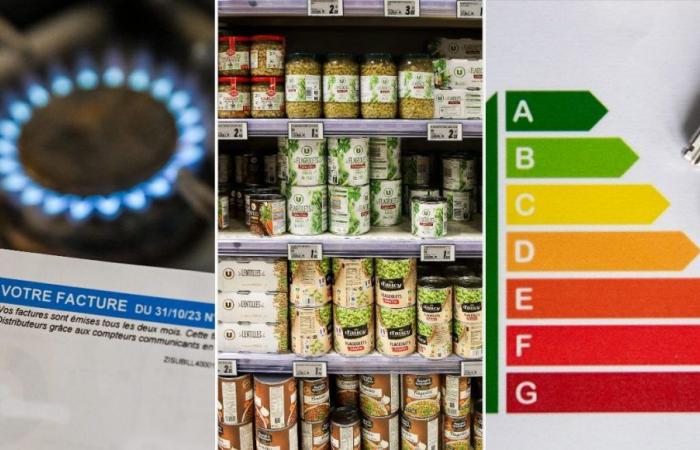At the start of each month there is a series of administrative changes, price variations and the entry into force of new measures. Overview of the small and big changes that will take place from Monday.
Increase in gas prices
The average price of the gas bill for millions of French people will increase by 11.7% in July compared to June. This increase represents an average of 124 euros more on the annual bill of French people who heat and cook with gas. This price is up compared to the June price but remains 3.5% lower than the average price of January 1, 2024.
This increase is mainly due to the revaluation for four years of the rate for transporting gas to homes and businesses, in other words, the toll that the network manager GRDF charges suppliers.
Fight against “shrinkflation”
Starting Monday, Supermarkets will have to inform their customers when products on the shelves have seen their quantity drop without their price decreasingwhat is called “shrinkflation”. All supermarkets over 400 square meters in France will be required toaffix a “visible” and “readable” label or placard near, or even directly on the packaging, of all the products concerned.
“Shrinkflation” – from the English verb “to shrink” – consists, for manufacturers of consumer products, agro-industrialists or distributors, of reducing the quantities of products sold rather than significantly increasing prices, in a context where food prices have already increased by 20% in two years. For example, a lighter but more expensive pack of cereals.
Revaluation of unemployment benefits
Unemployment insurance benefits will be increased by 1.2% on July 1indicated Unédic. This revaluation “would concern around 2 million compensated job seekers” out of some 2.7 million in total, according to a press release from the organization managed jointly by trade unions and employers’ organizations. Certain recipients of less than six months are not affected.
This revaluation “takes into account both the economic context and the financial balance of the unemployment insurance system”. Elle “comes after two others in 2023 (+1.9% on April 1, then +1.9% on July 1)”. A recipient who has not worked during the month and receives the minimum allowance will thus go from 979.29 euros gross to 991.07 euros gross, details Unédic. The CGT, however, denounced “the extreme weakness of this revaluation” and the CFDT expressed a “bitter disappointment“.
On the other hand, the decree concerning the new controversial reform of unemployment insurance will not be published by July 1, contrary to what the government had indicated. This reform includes in particular a duration of compensation reduced from 18 to 15 months, and the need to have worked eight months over the last 20 months to be compensated (compared to six over the last 24 months currently).
Correction of the DPE calculation
Of the “simplifications” in the calculation of the new energy performance diagnosis (DPE) of a dwelling must come into force this Monday. Introduced in 2006, the DPE classifies dwellings from A to G according to their energy consumption and, since 2021, their impact on the climate. Faced with the “complexities” et “bias“calculation concerning small dwellings – less than 40 m2 -, the Minister of Ecological Transition Christophe Béchu announced in February a correction of the calculation, effective from July 1.
This change should remove 140,000 homes from the energy sieve category (F or G labels). This change is important because since January 1, 2023, the law prohibits the rental of the most energy-intensive homes (classified G+) and this ban will be extended from January 1, 2025 to all G-classified homes.
From Monday, “if you are concerned, you can download the certificate replacing the first page of your DPE for possible sale or rental”indicates the site of Ademe.
Opening of the new savings plan for young people
The “future climate savings plan”, open exclusively to under-21s, is in place from Monday. It should make it possible to dedicate part of French savings to financing low-carbon projects. This is part of the green industry law, the objective of which is to reindustrialize France while promoting decarbonization.
“Only one plan can be opened per natural person” and payments are limited to 22,950 euros, specifies the government website.
A new obligation for new vehicles
From Monday, all new vehicles placed on the market and registered for the first time must be equipped with l’AIVincluding models released before July 2024. AIV is an intelligent speed adaptation system intended to help the driver maintain the permitted speed on the roadFor two years, it has already been mandatory for all new vehicles newly approved in France and Europe.
“The intelligent speed adaptation system is activated if you unknowingly drive beyond the speed limit on the lane you are driving on”noted the government website. “Concretely, the AIV will inform you of the speed limit and warn you if you exceed it. For equipped vehicles, the cruise control function (SCF) will automatically cause a gradual deceleration of the vehicle by reducing its power or by ‘hardening’ the travel of the accelerator pedal. At the same time, a visual and audible alert will be triggered.”
This system is made possible by the detection of traffic signs by on-board cameras and/or using the vehicle’s GPS system. The ultimate goal is to reduce speeding and accidents on the roads.
A new delimitation of rural areas
The reform of “rural revitalization zones” (ZRR)renamed FRR, comes into force this Monday. Some 20,000 rural municipalities will be included in the new zoning, which opens the right to tax and social exemptions to support activity in rural areas. This system is often cited by elected officials as a way to attract medical and paramedical professions to rural areas.
The reform also creates two levels of zoning: FRR base and, for the quarter of municipalities that need it most, a reinforced level FRR plus.
Slight increase in car and home insurance
Car and home insurance will increase by a few cents this Monday due toan increase in the “attack” tax. This tax, which helps finance the Guarantee Fund for victims of acts of terrorism and other offenses, will increase by 60 cents from 5.90 euros to 6.50 euros.






